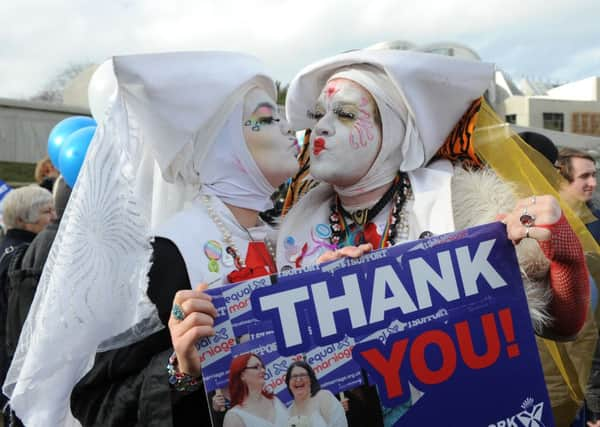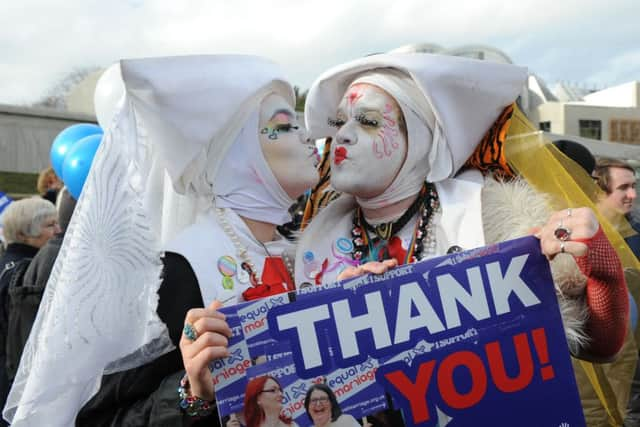Same-sex marriage: MSPs pass gay marriage bill


The subject has been one of the most bitterly fought in the Scottish Parliament’s 15-year history, with widespread opposition among religious groups who fear it will undermine marriage and traditional values.
But campaigners say gay Scots will finally be recognised as equal in the eyes of the law, after Scotland became the 17th country to adopt the change.
Advertisement
Hide AdAdvertisement
Hide AdMSPs passed the Same Sex Marriage Bill at Holyrood by 105 votes to 18. But even this was marked by acrimony as attempts to introduce safeguards for religious Scots were rejected by MSPs.


The legislation prompted a frosty reaction from the Kirk.
“The Church of Scotland holds to the mainstream Christian belief that marriage is properly between a man and a woman,” said Alan Hamilton, convenor of the Kirk’s legal questions committee.
Protesters made a last stand outside Holyrood yesterday to voice their concerns about the impact on families, but they were outnumbered by hundreds of supporters rallying to celebrate the change.
Health secretary Alex Neil told MSPs they were doing a “remarkable thing” in passing new laws. He said: “We are saying on behalf of Scotland to the world, loud and clear, that we believe in recognising love between same-sex couples as we do between opposite-sex couples.”
But he stressed the that Scottish Government “respected the decision” of those religious groups who did not want to perform same-sex marriage, with protections included in the legislation “so they can not be forced” to take part.
An “opt-in” system is to be adopted, meaning that churches which do not want to conduct gay weddings do not have to, according to Mr Neil, who said Scotland’s first gay weddings could take place “this year”.
The UK Equality Act has also been changed to protect individual ministers and priests who do not want to conduct same-sex marriages from court actions claiming discrimination.
“Today is a momentous day for equality in our nation,” Mr Neil added. “This legislation sends a powerful message to the world about the kind of society we in Scotland are trying to create – a nation where the principles of fairness and equality are weaved into the very fabric of our society.”
Advertisement
Hide AdAdvertisement
Hide AdBut SNP ministers Roseanna Cunningham and Fergus Ewing were among those who voted against the measure, along with Labour MSP and deputy presiding officer Elaine Smith Almost 80,000 Scots responded to a government consultation on the issue, the highest ever for a piece of Holyrood legislation.
About two-thirds were opposed to the measure, although this has been put down to a well-organised campaign among the Scotland For Marriage umbrella group of religious bodies. Social attitudes surveys in Scotland have previously indicated that Scots are broadly supportive.
Colin Macfarlane, director of Stonewall Scotland, said: “We’re delighted that MSPs have overwhelmingly demonstrated that they’re committed to building a Scotland fit for the 21st century.”
The measure has already been introduced south of the Border, where the first gay marriages are to be held next month.
Christian MSPs wanted to change the legislation at Holyrood yesterday to introduce even more protection for ministers and priests who do not want to take part.
The Church of Scotland has already voiced concerns that it may be forced to stop holding marriages amid fears over the costs of looming legal challenges if it does not take part.
Mr Hamilton said last night that its marriages may be “forced out of the present legal framework” as a result of the change. He said: “We are also concerned that public servants, particularly registrars and teachers, who do not support same-sex marriage, may find themselves disadvantaged in the workplace.”
Civil partnerships were introduced in 2005, but campaigners say allowing gay couples to marry gives them full “equality” in the eyes of the law.
Advertisement
Hide AdAdvertisement
Hide AdA spokesman for the campaign group Scotland for Marriage said: “The overwhelming majority of MSPs have ignored public opinion and steam-rollered through a law which is ill-conceived, poorly thought out and will, in time, discriminate against ordinary people for their sincerely held beliefs.”
Labour’s Jackie Baillie gave her backing to the bill, stating: “It’s time for change, it’s time to support equal marriage.”
Tory MSP Jackson Carlaw said there was a “celebratory attitude” at Holyrood as the legislation was being debated.
He told how he had been married for 26 years, and said: “I want every couple in Scotland regardless of their sex to be able to have exactly the same opportunity to enjoy the long and happy marriage we have had.”
Liberal Democrat MSP Jim Hume said: “We want Scotland to be one of the fairest and most equal places in the world.”
Cheers and jeers as both sides come to Holyrood
Supporters and opponents of gay marriage made a last stand outside Holyrood yesterday before the historic change was backed by MSPs.
A rally backing the measure witnessed a mock wedding conducted by the Rev Maud Robinson of the Unitarians and saw older couple Jerry Slater and Larry Lamont from Kircudbright cheered on as they “tied the knot” .
Tim Hopkins of the Equality Network was among those who joined revellers.
Advertisement
Hide AdAdvertisement
Hide AdHe said: “I’ve been waiting for this day for many years to see people waiting to get married for the first time and treated like equals under the law.
“I’ve been involved in equality campaigning since 1987 and this is a day I never thought I would see.”
Annie Park, chair of lesbian, gay, bisexual, and transgender choir Loud & Proud, said: “It’s a historic day and we feel very proud to be here and part of a fight that has gone on for decades.
“It’s joyous and music is a great way to celebrate this.”
But the Rev James Gracie of the Free Church of Scotland Continuing in Edinburgh was among those who joined the protests.
“Scotland is rejecting God today,” he said.
“God has told us in his word that marriage is between a man and a woman.”
Pastor David Richardson of the Vizion Church in East Kilbride: “If you redefine marriage as they’re doing today, who’s to say they won’t do it again and you’ll have two women and one man – or in five years three men and one woman?”
Scotland becomes 17th country to legalise gay marriage
Scotland becomes the 17th country in the world to legalise gay marriage after yesterday’s vote.
The Netherlands became the first country to allow same-sex marriage 13 years ago and many have followed suit across the globe. France legalised same-sex marriage in 2013, however protests are now being carried out across the country by conservatives who are concerned over the impact on traditional families.
Advertisement
Hide AdAdvertisement
Hide AdSouth Africa became the first African country to bring in marriage for gay couples in 2006, despite homosexuality remaining taboo in large parts of the continent.
Despite strong Catholic roots in southern Europe, Spain was among the first countries to introduce the change in 2005. Portugal faced fierce opposition from campaigners who narrowly failed to get enough support for a referendum two years after it was legalised.
Iceland’s prime minister Johanna Sigurdardottir married her female partner on the day the country’s gay marriage law came into force.
SEE ALSO